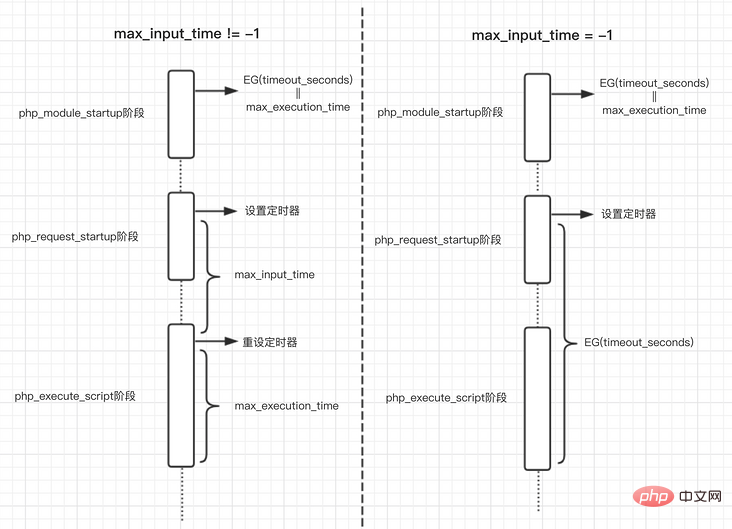本篇文章带大家聊聊PHP配置文件,解析一下配置文件(php.ini 和 php-fpm.conf)中的几种超时相关的配置,希望能够给大家提供帮助!

一、概要
php.ini 和 php-fpm.conf 中有很多超时相关的配置,那么这些配置到底有什么作用呢?在源码中又是怎么实现的呢?这篇文章就来讲讲下面几种超时配置:
php.ini
- max_execution_time
- max_input_time
php-fpm.conf
- process_control_timeout
- request_terminate_timeout
- request_slowlog_timeout
运行环境: Mac 10.14.2 + PHP 7.3.7
二、配置解析规则
解析规则
php.ini的解析是在php_module_startup()阶段完成,ini_entry是在 main.c 中为每个php.ini配置定义的解析规则,格式如下:
ZEND_INI_ENTRY3_EX(name, default_value, modifiable, on_modify, arg1, arg2, arg3, displayer)
PHP为不同类型的配置定义了很多宏,ZEND_INI_ENTRY3_EX 是它们展开后的最终宏,比如PHP_INI_ENTRY宏
PHP_INI_ENTRY(name, default_value, modifiable, on_modify)
参数解释
name: 配置名称
default_value: 配置默认值
modifiable: 配置的可被设定范围
这些模式决定着一个 PHP 的指令在何时何地,是否能够被设定。手册中的每个指令都有其所属的模式。例如有些指令可以在 PHP 脚本中用 ini_set() 来设定,而有些则只能在 php.ini 或 httpd.conf 中。
例如 output_buffering 指令是属于 PHP_INI_PERDIR,因而就不能用 ini_set() 来设定。但是 display_errors 指令是属于 PHP_INI_ALL 因而就可以在任何地方被设定,包括 ini_set()。
模式 含义 PHP_INI_USER 可在用户脚本(例如 ini_set())或 Windows 注册表(自 PHP 5.3 起)以及 .user.ini 中设定 PHP_INI_PERDIR 可在 php.ini,.htaccess 或 httpd.conf 中设定 PHP_INI_SYSTEM 可在 php.ini 或 httpd.conf 中设定 PHP_INI_ALL 可在任何地方设定
on_modify: 配置修改函数
三、max_input_time、max_execution_time
因为max_input_time 和 max_execution_time 联系比较密切,所以放在一起来讲。
php.ini 解释
max_input_time
; Maximum amount of time each script may spend parsing request data. It's a good
; idea to limit this time on productions servers in order to eliminate unexpectedly
; long running scripts.
; Note: This directive is hardcoded to -1 for the CLI SAPI
; http://php.net/max-input-time翻译过来就是:
max_input_time是每个脚本可以花在解析请求数据上的最大时间。在生产服务器上通过限制max_input_time可以清除掉长时间运行的脚本。在CLI模式下会硬编码为-1,即无限制。max_execution_time
; Maximum execution time of each script, in seconds
; http://php.net/max-execution-...
; Note: This directive is hardcoded to 0 for the CLI SAPI翻译:
max_execution_time是每个脚本的最大可执行时间。在CLI模式下硬编码为0
配置解析规则
// max_input_time,默认值为无限制
STD_PHP_INI_ENTRY("max_input_time", "-1", PHP_INI_SYSTEM|PHP_INI_PERDIR, OnUpdateLong, max_input_time, php_core_globals, core_globals)
// max_execution_time,默认值为30s,修改函数为OnUpdateTimeout
PHP_INI_ENTRY("max_execution_time", "30", PHP_INI_ALL, OnUpdateTimeout)OnUpdateTimeout()函数如下,由第二节可知配置解析发生在php_module_startup()阶段,此时EG(timeout_seconds)被赋值为了max_execution_time,但还没有设置定时器。
// main.c
static PHP_INI_MH(OnUpdateTimeout)
{
if (stage==PHP_INI_STAGE_STARTUP) {
/* Don't set a timeout on startup, only per-request */
/* EG(timeout_seconds) = max_execution_time */
ZEND_ATOL(EG(timeout_seconds), ZSTR_VAL(new_value));
return SUCCESS;
}
zend_unset_timeout();
ZEND_ATOL(EG(timeout_seconds), ZSTR_VAL(new_value));
zend_set_timeout(EG(timeout_seconds), 0);
return SUCCESS;
}设置超时定时器
// main.c
int php_request_startup(void)
{
......
if (PG(max_input_time) == -1) {
zend_set_timeout(EG(timeout_seconds), 1);
} else {
zend_set_timeout(PG(max_input_time), 1);
}
......
}
int php_execute_script(zend_file_handle *primary_file)
{
......
if (PG(max_input_time) != -1) {
zend_set_timeout(INI_INT("max_execution_time"), 0);
}
......
}从上面代码可以看到,如果设置了max_input_time(即值不等于-1,-1可以认为是在CLI模式下),在php_request_startup()阶段会设置一个定时器,超时时间为max_input_time;在php_execute_script()阶段会重新设置一个定时器,超时时间为max_execution_time。那么整个PHP脚本执行的最大执行时间就等于max_input_time + max_execution_time。
如果没有设置max_input_time的话(即值等于-1),在php_request_startup()阶段也会设置一个定时器,但超时时间被设为了EG(timeout_seconds),而EG(timeout_seconds)已经在php_module_startup()阶段被赋值为max_execution_time,所以此时的超时时间就是max_execution_time;在php_execute_script()阶段不会重新设置定时器,前一阶段设置的max_execution_time定时器仍然生效着。那么整个PHP脚本的最大执行时间就是max_execution_time。
zend_set_time() 使用setitimer(ITIMER_PROF, &t_r, NULL); 来实现定时器,ITIMER_PROF会统计包括用户态和内核态下所花费的时间,而像sleep()这样的系统调用会让进程挂起,不占用cpu时间片,所以这俩超时时间是不包括sleep()时间的。
当定时器到时间后,ZendVM会抛出E_ERROR,即Fatal error错误。
四、process_control_timeout
php-fpm.conf 解释
; Time limit for child processes to wait for a reaction on signals from master.
; Available units: s(econds), m(inutes), h(ours), or d(ays)
; Default Unit: seconds翻译:
process_control_timeout是留给子进程处理来自master进程信号的时间限制。
分析
当master进程接收到SIGINT、SIGTERM、SIGQUIT、SIGUSR2这些信号时,会调用fpm_pctl()来进行处理。
首先master进程会根据 接收到的信号 和 当前fpm的运行状态 来决定发送给worker进程的是SIGQUIT还是SIGTERM信号,同时注册时间为process_control_timeout的定时事件。
如果在process_control_timeout时间内子进程没有退出,那么master进程会升级SIGQUIT为SIGTERM,SIGTERM为SIGKILL,并注册1s的定时事件。SIGKILL就直接终止worker进程了,SIGTERM还能再给worker进程1s的时间。
综上,process_control_timeout可以理解为master进程留给worker进程结束自己的时间,要是到时间worker还没搞定那就开始master自己的策略了。
五、request_terminate_timeout、request_slowlog_timeout
因为request_terminate_timeout 和 request_slowlog_timeout 联系比较密切,所以放在一起来讲。
php-fpm.conf 解释
request_terminate_timeout
; The timeout for serving a single request after which the worker process will
; be killed. This option should be used when the 'max_execution_time' ini option
; does not stop script execution for some reason. A value of '0' means 'off'.
; Available units: s(econds)(default), m(inutes), h(ours), or d(ays)
; Default Value: 0翻译:执行一个请求的超时时间,在这之后worker进程将被终止。这个选项应该被用在
max_execution_time这个ini选项由于某些原因不能停止脚本执行的时候。request_slowlog_timeout
; The timeout for serving a single request after which a PHP backtrace will be
; dumped to the 'slowlog' file. A value of '0s' means 'off'.
; Available units: s(econds)(default), m(inutes), h(ours), or d(ays)
; Default Value: 0翻译:执行一个请求的超时时间,在这之后一个PHP的backtrace会被输出到slowlog文件里。
分析
request_slowlog_timeout 和 request_terminate_timeout 用在master进程的心跳检测中(fpm_pctl_heartbeat()),心跳时间heartbeat 简化后的算法是
在开启
request_terminate_timeout情况下:request_terminate_timeout/1000*3在未开启
request_terminate_timeout情况下:request_slowlog_timeout/1000*3或者 0request_terminate_timeout >= request_slowlog_timeout
第三条规则是为了保证slowlog不影响到正常的请求,heartbeat 取超时时间的1/3应该是为了避免心跳检测过于频繁,因为每次心跳检测都需要遍历所有worker进程。
如果超时事件发生了,那么将直接kill掉worker进程,kill(child_pid, SIGTERM); ,之后内核回收资源关闭client_socket,nginx返回502错误给浏览器。
推荐学习:《PHP视频教程》
以上是浅析PHP配置文件中的几种超时配置的详细内容。更多信息请关注PHP中文网其他相关文章!
 您如何防止与会议有关的跨站点脚本(XSS)攻击?Apr 23, 2025 am 12:16 AM
您如何防止与会议有关的跨站点脚本(XSS)攻击?Apr 23, 2025 am 12:16 AM要保护应用免受与会话相关的XSS攻击,需采取以下措施:1.设置HttpOnly和Secure标志保护会话cookie。2.对所有用户输入进行输出编码。3.实施内容安全策略(CSP)限制脚本来源。通过这些策略,可以有效防护会话相关的XSS攻击,确保用户数据安全。
 您如何优化PHP会话性能?Apr 23, 2025 am 12:13 AM
您如何优化PHP会话性能?Apr 23, 2025 am 12:13 AM优化PHP会话性能的方法包括:1.延迟会话启动,2.使用数据库存储会话,3.压缩会话数据,4.管理会话生命周期,5.实现会话共享。这些策略能显着提升应用在高并发环境下的效率。
 什么是session.gc_maxlifetime配置设置?Apr 23, 2025 am 12:10 AM
什么是session.gc_maxlifetime配置设置?Apr 23, 2025 am 12:10 AMthesession.gc_maxlifetimesettinginphpdeterminesthelifespanofsessiondata,setInSeconds.1)它'sconfiguredinphp.iniorviaini_set().2)abalanceIsiseededeedeedeedeedeedeedto to to avoidperformance andununununununexpectedLogOgouts.3)
 您如何在PHP中配置会话名?Apr 23, 2025 am 12:08 AM
您如何在PHP中配置会话名?Apr 23, 2025 am 12:08 AM在PHP中,可以使用session_name()函数配置会话名称。具体步骤如下:1.使用session_name()函数设置会话名称,例如session_name("my_session")。2.在设置会话名称后,调用session_start()启动会话。配置会话名称可以避免多应用间的会话数据冲突,并增强安全性,但需注意会话名称的唯一性、安全性、长度和设置时机。
 您应该多久再生一次会话ID?Apr 23, 2025 am 12:03 AM
您应该多久再生一次会话ID?Apr 23, 2025 am 12:03 AM会话ID应在登录时、敏感操作前和每30分钟定期重新生成。1.登录时重新生成会话ID可防会话固定攻击。2.敏感操作前重新生成提高安全性。3.定期重新生成降低长期利用风险,但需权衡用户体验。
 如何在PHP中设置会话cookie参数?Apr 22, 2025 pm 05:33 PM
如何在PHP中设置会话cookie参数?Apr 22, 2025 pm 05:33 PM在PHP中设置会话cookie参数可以通过session_set_cookie_params()函数实现。1)使用该函数设置参数,如过期时间、路径、域名、安全标志等;2)调用session_start()使参数生效;3)根据需求动态调整参数,如用户登录状态;4)注意设置secure和httponly标志以提升安全性。
 在PHP中使用会议的主要目的是什么?Apr 22, 2025 pm 05:25 PM
在PHP中使用会议的主要目的是什么?Apr 22, 2025 pm 05:25 PM在PHP中使用会话的主要目的是维护用户在不同页面之间的状态。1)会话通过session_start()函数启动,创建唯一会话ID并存储在用户cookie中。2)会话数据保存在服务器上,允许在不同请求间传递数据,如登录状态和购物车内容。
 您如何在子域中分享会议?Apr 22, 2025 pm 05:21 PM
您如何在子域中分享会议?Apr 22, 2025 pm 05:21 PM如何在子域名间共享会话?通过设置通用域名的会话cookie实现。1.在服务器端设置会话cookie的域为.example.com。2.选择合适的会话存储方式,如内存、数据库或分布式缓存。3.通过cookie传递会话ID,服务器根据ID检索和更新会话数据。


热AI工具

Undresser.AI Undress
人工智能驱动的应用程序,用于创建逼真的裸体照片

AI Clothes Remover
用于从照片中去除衣服的在线人工智能工具。

Undress AI Tool
免费脱衣服图片

Clothoff.io
AI脱衣机

Video Face Swap
使用我们完全免费的人工智能换脸工具轻松在任何视频中换脸!

热门文章

热工具

SublimeText3 Linux新版
SublimeText3 Linux最新版

VSCode Windows 64位 下载
微软推出的免费、功能强大的一款IDE编辑器

MinGW - 适用于 Windows 的极简 GNU
这个项目正在迁移到osdn.net/projects/mingw的过程中,你可以继续在那里关注我们。MinGW:GNU编译器集合(GCC)的本地Windows移植版本,可自由分发的导入库和用于构建本地Windows应用程序的头文件;包括对MSVC运行时的扩展,以支持C99功能。MinGW的所有软件都可以在64位Windows平台上运行。

Dreamweaver Mac版
视觉化网页开发工具

DVWA
Damn Vulnerable Web App (DVWA) 是一个PHP/MySQL的Web应用程序,非常容易受到攻击。它的主要目标是成为安全专业人员在合法环境中测试自己的技能和工具的辅助工具,帮助Web开发人员更好地理解保护Web应用程序的过程,并帮助教师/学生在课堂环境中教授/学习Web应用程序安全。DVWA的目标是通过简单直接的界面练习一些最常见的Web漏洞,难度各不相同。请注意,该软件中






